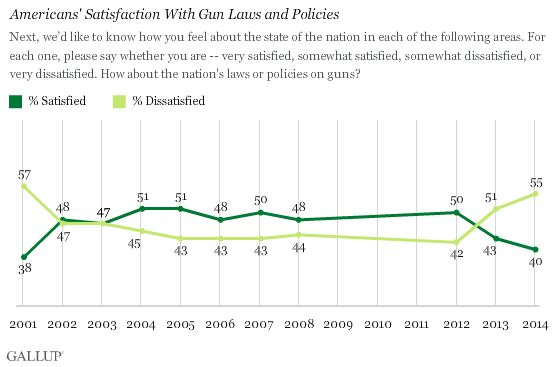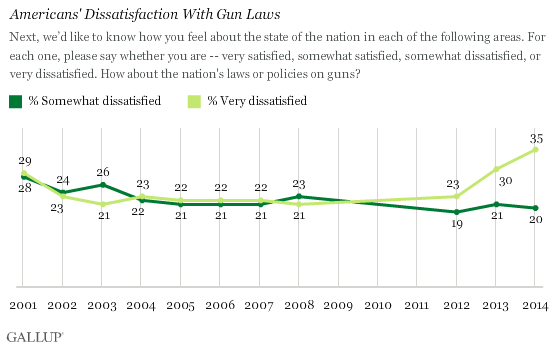WASHINGTON, D.C. -- Americans' dissatisfaction with U.S. gun laws and policies has increased to 55%, nearly matching the high of 57% in 2001. Forty percent are satisfied, down from the historical average of 47% since Gallup began asking this question in this way in 2001.

Overall, Americans' satisfaction with gun laws ranks near the middle of a list of 19 issues measured in Gallup's 2014 update of its annual Mood of the Nation survey. The highest levels of satisfaction were with the nation's military strength and ability to deal with terrorism; the lowest were with poverty and homelessness and the state of the nation's economy.
Americans may be dissatisfied with gun laws because they believe they should be stricter, or because they believe the laws are too strict as they are. Therefore, Gallup asks those who are dissatisfied with gun laws to choose among explanations for their dissatisfaction. Those who are dissatisfied have historically leaned heavily in the direction of wanting stricter rather than less strict laws.
But this year, the gap between those wanting stricter gun laws and those wanting less strict laws narrowed as a result of a sharp increase in the percentage of Americans who want less strict laws, now at 16% up from 5% a year ago. Support for making gun laws stricter fell to 31% from 38% last January. The January 2013 poll was conducted shortly after the December 2012 Sandy Hook school shooting tragedy, which sparked some state governments to consider new gun laws and a robust national discussion about the issue.

More Americans "Very Dissatisfied" With Current U.S. Gun Laws Than Ever Before
In addition to overall dissatisfaction with gun laws rising, more Americans this year are "very dissatisfied" (35%) versus "somewhat dissatisfied" (20%). The 15-percentage-point gap between these views is the largest in Gallup's trend.

Implications
In the wake of multiple shootings around the U.S over the last few years, President Barack Obama pledged in his 2014 State of the Union address that he would continue trying to prevent shootings in shopping malls, movie theaters, and schools. Several states introduced legislation in 2013 to restrict gun ownership, although similar legislation failed at a national level.
Americans have become more dissatisfied with gun laws over the past year, but this is attributable to a greater percentage who say gun laws are too strict, rather than not being strict enough. Americans' changing views could set the course for future gun law debates and legislation.
Survey Methods
Results for this Gallup poll are based on telephone interviews conducted Jan. 5-8, 2014, with a random sample of 1,018 adults, aged 18 and older, living in all 50 U.S. states and the District of Columbia.
For results based on the total sample of national adults, the margin of sampling error is ±4 percentage points at the 95% confidence level.
Interviews are conducted with respondents on landline telephones and cellular phones, with interviews conducted in Spanish for respondents who are primarily Spanish-speaking. Each sample of national adults includes a minimum quota of 50% cellphone respondents and 50% landline respondents, with additional minimum quotas by time zone within region. Landline and cellular telephone numbers are selected using random-digit-dial methods. Landline respondents are chosen at random within each household on the basis of which member had the most recent birthday.
Samples are weighted to correct for unequal selection probability, nonresponse, and double coverage of landline and cell users in the two sampling frames. They are also weighted to match the national demographics of gender, age, race, Hispanic ethnicity, education, region, population density, and phone status (cellphone only/landline only/both, cellphone mostly, and having an unlisted landline number). Demographic weighting targets are based on the most recent Current Population Survey figures for the aged 18 and older U.S. population. Phone status targets are based on the most recent National Health Interview Survey. Population density targets are based on the most recent U.S. census. All reported margins of sampling error include the computed design effects for weighting.
In addition to sampling error, question wording and practical difficulties in conducting surveys can introduce error or bias into the findings of public opinion polls.
View methodology, full question results, and trend data.
For more details on Gallup's polling methodology, visit www.gallup.com.
